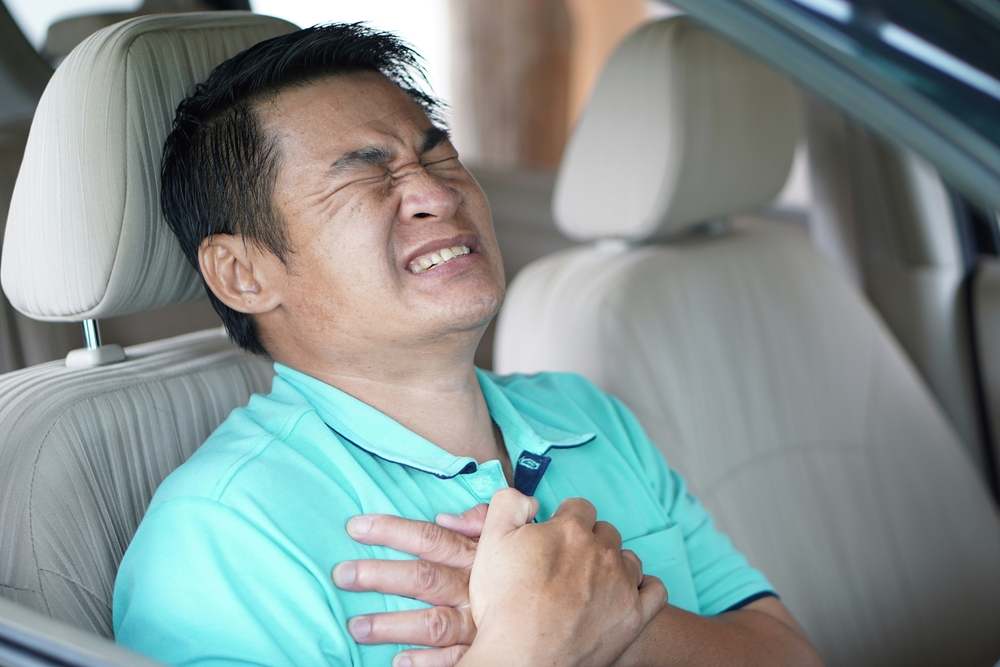 Getting into a car accident can be a stressful and traumatic experience. The shock of such an unexpected, violent event can leave you feeling shaken whether or not you suffered any injuries. In fact, when you think of car accident injuries, the first ones that come to mind might be whiplash, broken bones, scrapes, bruises, and even a concussion. What you might not always consider is how a car accident could trigger a significant health event like a heart attack or stroke. However, people who are at higher risk for heart attack or stroke can experience one of these medical emergencies after a car accident. Here’s what you need to know about a stroke from a car accident and how it could impact you or someone you love.
Getting into a car accident can be a stressful and traumatic experience. The shock of such an unexpected, violent event can leave you feeling shaken whether or not you suffered any injuries. In fact, when you think of car accident injuries, the first ones that come to mind might be whiplash, broken bones, scrapes, bruises, and even a concussion. What you might not always consider is how a car accident could trigger a significant health event like a heart attack or stroke. However, people who are at higher risk for heart attack or stroke can experience one of these medical emergencies after a car accident. Here’s what you need to know about a stroke from a car accident and how it could impact you or someone you love.
What Is a Stroke?
A stroke is a medical condition where either a blockage prevents blood supply to the brain or one of the blood vessels in the brain ruptures and bleeds. Either of these two events is considered a stroke and can prevent your brain from getting the oxygen and blood it needs to function. Strokes are also one of the leading causes of death in the United States because without your brain getting enough blood or oxygen the tissue gets damaged very quickly and begins to die. Nearly one in four people who have a stroke have also had a previous stroke. While not every stroke is fatal, they can lead to a host of long-term complications that impact your quality of life moving forward.
Three Main Types of Strokes
There are three main types of strokes that are differentiated based on their different causes. Here’s what you need to know about each type of stroke and how it could affect you:
Transient Ischemic Attack
The first type of stroke is known as a transient ischemic attack, abbreviated as TIA for short. A transient ischemic attack refers to when a blood clot develops in or around the brain. This type of blockage is typically only temporary, which is why a TIA is also sometimes referred to as a mini-stroke. A transient ischemic attack may cause symptoms of a stroke for a few minutes until the blockage resolves itself and blood flow to the brain is restored. Doctors consider a history of TIAs as a warning sign that you could suffer an actual stroke in the future. That is why doctors treat a transient ischemic attack the same as they would another type of stroke with emergency medical attention.
Ischemic Stroke
The second type of stroke is an ischemic stroke, which involves a blockage in an artery that serves the brain. The blockage that causes an ischemic stroke is typically either a blood clot or a buildup of plaque. A blood clot can develop in another part of the body, like the heart or an artery in your neck, before traveling to an artery that provides blood flow to the brain. An ischemic stroke is considered a major stroke because the arteries that supply the brain with blood become too narrow or completely blocked. When blood flow is severely reduced to the brain, it can cause a stroke.
Hemorrhagic Stroke
The third type of stroke is called a hemorrhagic stroke, where a blood vessel either leaks or bursts, causing that blood to seep into the brain. The brain has many arteries that provide oxygen-rich blood flow to the area, and if one of the blood from these arteries puts pressure on the brain, it can cause swelling and damage to brain tissue. If the tissues that surround the brain fill with blood from a burst artery or blood vessel, it can lead to a hemorrhagic stroke that can cause significant symptoms and complications.
Signs of a Stroke after a Car Accident
 Whenever there is restricted blood flow to the brain, you can experience a wide array of symptoms. Here are the main signs of a stroke categorized by how they impact the body. It is important to note that not all the symptoms listed below may be present if you suffer from a stroke. However, stroke symptoms often only impact one side of the body, so here are a few signs to look out for if you or someone you know is in medical distress that may be a stroke.
Whenever there is restricted blood flow to the brain, you can experience a wide array of symptoms. Here are the main signs of a stroke categorized by how they impact the body. It is important to note that not all the symptoms listed below may be present if you suffer from a stroke. However, stroke symptoms often only impact one side of the body, so here are a few signs to look out for if you or someone you know is in medical distress that may be a stroke.
Muscular
A stroke can cause difficulty with mobility and coordination. You may have trouble walking, stiff muscles, overactive reflexes, or trouble balancing. A stroke can also cause paralysis on one side of the body. Sudden, severe headaches, nausea and vomiting, and seizures can also occur.
Speech
A stroke can cause symptoms that impact your speech and cognition, including difficulty speaking. You may notice your speech sounds slurred or lose the ability to speak altogether. A stroke can affect the facial muscles, leading to muscle weakness or numbness that makes it difficult to form words correctly. Mental confusion and an inability to understand conversations or basic information can also occur.
Sensory
A stroke can lead to blurred vision or double vision. Some people who suffer a stroke report sudden loss of vision which can be temporary and affect either one or both eyes. A stroke can cause weakness or numbness in your extremities and a pins and needles sensation. A stroke could also cause a reduced sensation of touch in multiple parts of the body.
Behavioral
A stroke can also impact your behavior and cause confusion, increased agitation, and other sudden types of behavioral changes.
Complications from a Stroke
If you suffered a stroke after a car accident, you could experience an array of complications. Stroke complications can occur due to a lack of oxygen and blood to the brain for a certain amount of time or because of an additional injury to the brain. Complications after a stroke may include:
- Seizures
- Inability to control certain muscles
- Loss of bladder and bowel control
- Sensory changes
- Mood or emotional changes
- Cognitive impairment
- Bed sores
Risk Factors for a Stroke
There are a variety of risk factors that can increase your chances of suffering a stroke. Age, sex, and ethnicity can increase your risk factors for stroke. Your doctor will talk to you about your medical history and the following risk factors to help you understand your risk factors for a stroke.
Genetics
While you can’t control your genetics, your family history can factor into whether you are more susceptible to suffering a stroke. A family history of heart disease, blood clots, and strokes can put you at greater risk of suffering a stroke.
Medical Conditions
If you have certain medical conditions, you could also be at increased risk for a stroke. High blood pressure, high cholesterol, and heart disorders are common medical conditions that could put you at greater risk for blood clots, clogged arteries, and stroke. Other medical conditions that are risk factors for a stroke include heart valve defects, irregular heartbeats, sickle cell disease, and diabetes.
Diet
An unbalanced diet can also increase your chances of suffering a stroke. A diet high in salt, cholesterol, and fat can increase your risk for stroke. Try to avoid too many foods with saturated and trans fats, as these can also contribute to a buildup of plaque in your arteries that can increase your risk for clots.
Substance Use
Alcohol and tobacco use can also impact your risk of suffering a stroke. Heavy alcohol use can increase your blood pressure and narrow your blood vessels. The nicotine in tobacco products can also raise your risk for stroke because nicotine damages blood vessels and the heart.f
Inactivity
Inactivity or living a more sedentary lifestyle can increase your risk for stroke. Regular exercise offers a wide variety of health benefits, including maintaining healthy blood flow, blood pressure, and other cardiac impacts that can decrease your risk of blood clots.
How to Diagnose a Stroke
If your doctor suspects you suffered a stroke after a car accident, they will run various tests to confirm or rule out the condition. Some tests for stroke include blood tests, an MRI or CT scan, and an EKG. Blood tests can help determine your cholesterol levels, blood sugar levels, and other factors that can signal a stroke. An MRI or CT scan can be used to detect any damage to brain tissue, brain cells, or show any bleeding in the area. These scans can also help rule out a stroke by determining another condition that might be causing your symptoms. An EKG, or electrocardiogram, records the electrical activity in your heart, which includes your heart rhythm and how fast your heart beats. Other diagnostic tools can include a cerebral angiogram, carotid ultrasound, or an echocardiogram.
Treatment & Recovery for a Stroke after a Car Accident
 You will need emergency medical attention as soon as possible to help you recover from a stroke. The longer your brain goes without oxygen or blood, the more damage can be done. Treatment options range from clot-breaking drugs to surgery. If you suffered a stroke after a car accident, our team of doctors at AICA Orthopedics can help support you through your treatment and recovery. Find a location near you to get started with our team of high-quality, competent car accident doctors at AICA Orthopedics in Snellville.
You will need emergency medical attention as soon as possible to help you recover from a stroke. The longer your brain goes without oxygen or blood, the more damage can be done. Treatment options range from clot-breaking drugs to surgery. If you suffered a stroke after a car accident, our team of doctors at AICA Orthopedics can help support you through your treatment and recovery. Find a location near you to get started with our team of high-quality, competent car accident doctors at AICA Orthopedics in Snellville.
